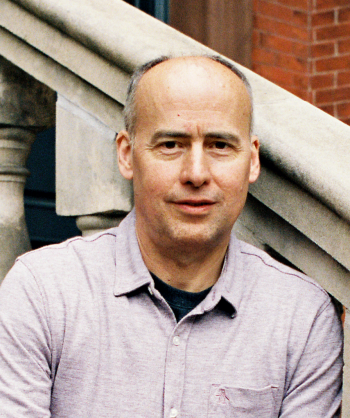
Epiphany in a Trolleycar
By Elliott Robertson
I was waiting for the trolley when two young women, dressed in their Sunday best, crossed over to my side of the trolley tracks. One of them asked me, “Do you know Jesus?”
I smiled and said, “Yes, I do.” I chuckled, for I couldn’t help but think it was almost as if we were talking about two different people.
 The lady asked me if I had a relationship with Jesus and I said “Yes”. I could have added, “I love Jesus,” but I didn’t.
The lady asked me if I had a relationship with Jesus and I said “Yes”. I could have added, “I love Jesus,” but I didn’t.
Next the lady asked me “Will you go to heaven?” to which I responded gaily, “I hope to go today.” I almost laughed at the thought that she might have taken my words to mean, “It would be nice to die today.”
The trolley came and I consented to receive one of the tracts without her asking me. The lady handed the top piece of paper from the stack she was carrying; I stepped onto the trolley.
After I found a seat, I thought back to the brief encounter. Somewhere within I had been thinking, my understanding of Jesus is right and yours is wrong. From the moment I heard the young woman ask me if I knew Jesus, I had been quite sure of this.
As I reflected upon this, I realized that there may very well be a sense in which neither the young woman nor I know or understand Jesus, at least on the human level of our existence. Our inability to grok all that he stands for and expresses is equal. We are very much on a level playing field in our relationship with Jesus. In fact, my assumption that I knew Jesus better than she did had been ugly.
Upon further reflection, I also noticed that even if it may be true that my understanding of Jesus as an ascended master—or beyond ascended mastership, for “ascended master” may be a limiting human concept—it doesn’t matter. The only thing that matters is the young woman’s willingness to receive love from Jesus and my willingness to receive love.
We didn’t come to Earth to paint portraits of God and to decide which portrait comes closest to representing God. We came to Earth to receive God’s love.
I will continue to reflect on this brief conversation. Was fear and my wish to be special underneath my assumption that I was superior to the young woman? As Choose Only Love counsels:
Perhaps you wonder how to release fear forever, and with it the desire to possess, so that now and forever you can live in a state of giving—that is, a life completely devoid of need. The answer is now obvious. When every lack is but an echo of a perceived lack of love, then the way to freedom from lack is but to let yourself be loved. Vol.2, Ch1:VII
Could Choose Only Love be saying that we can be free from the distorted perceptions that come from our human conditioning? That this freedom is our when we simply allow ourselves to receive love? Could my wish to be special and superior have come from distorted perceptions such as the perception of a lack of love? Could this wish for specialness have been dissolved if I had let myself be loved?
As we read in A Course of Love:
What you allow yourself to receive and what you do with what you receive is all that matters. You realize now that life itself is a channel and that you are constantly receiving. You still perhaps think in terms of receiving meaning that there is something given from a source beyond the Self, but this is the “thought” that has to change. If giving and receiving are one, then giver and receiver are also one. D:Day21.5-6
Jesus knows we are all equal, that we play on a level playing field. He does not court special relationships. He says Yes to holy relationships, only.
My refusal to see the young lady who asked me a few questions as my equal, as my true sister, was like a solid wall that kept me from allowing her fully into my life, into my heart. We must choose between superiority and embracing; the two cannot coexist, just as a light switch cannot be turned on and off in the same moment.
St. Bernard once said, “The three most important things are humility, humility and humility.” Nothing could be more true. If humanity is to conform to the heart of God, the heart that has no walls, the starting point will be humility.
Elliott Robertson is the author of Say Yes to Life and a Spiritual Growth Coach. He has served as a staff writer for Daily Word.
|
A Course in Miracles and A Course of Love invited us to heal our minds and hearts, returning us to our wholehearted selves. Now, ‘A Journey into the Unknown’ invites us to come “down from the mountain and onto level ground, the ground of the earth, the place where you are connected and interconnected to all that lives and breathes along with you.”
|

Temptations to Believe in Separation
By Laurel Elstrom
What tempts you to identify yourself as a separate person? Do you value the drama of your story? How would it feel to surrender control of your storyline and let things happen however they do? Without judgment, explore those areas that you still want to control. Don’t try to fix anything or change how you feel. Just bring awareness to your attachments.
Here are some common temptations to live separately:
- Perception of Security and Control. At least you know how this world works. Its familiarity draws you back. You have a framework around which to process most of what happens. Like a child who prefers to stay in an abusive home, its familiarity is at least predictable.
- The myth of independence. While there is still hope that this time you might get it right, you will be tempted to try once more to become a happy person. That system is rigged for failure. The pursuit of individual happiness is impossible because you are not a separate being. You will only be happy when you recognize your relationship with everything.
- Shame keeps people bound. “I am unworthy of living as the Christ. I have too many flaws.” (You’ll never be a worthy person because you are not a person at all!)
- Fear of losing relationships. (You won’t have fewer relationships. They’ll just be more authentic.)
- Reluctance to give up control.
The concept that you are a person is nothing more than an idea. It was never true. Your mind has created patterns to support and sustain that view of reality, but the lie doesn’t satisfy.
Many spiritual seekers respond to the longing to expand by attempting to swap a better, more spiritual identity for the old one. They try to perfect the personal self through study, sacrifice, and intense practice or purification. Ultimately, it never works because the foundational idea of any kind of separate self, even a kinder, more loving, more transcendent self is untrue. The system is rigged to force you out of identification eventually, with suffering as powerful motivator.
This is an excerpt from “Love on the Mountain: A Guide to Self-Discovery” by Laurel Elstrom, which uses “The Forty Days and Forty Nights” of A Course of Love as its framework for discovery. The first 34 pages can be viewed for free at Amazon.com. Laurel has shared her experience of ACIM and ACOL for over 30 years. www.laurelelstrom.com



Nice article, Elliot. Sending love.
Thank you. I’ve study/enjoy/live ACIM and ACOL. I enjoy people’s reflections on daily application. Where are you located? Study out of?
🙏Dominique
Dear Elliott, I resonate with your writing here!!! Even as I read it, I was judging the young woman with the tract as ‘less than’ enlightened you (and me, of course).
Thanks you for this illuminating writing. I am having a chuckle at myself and respecting you.